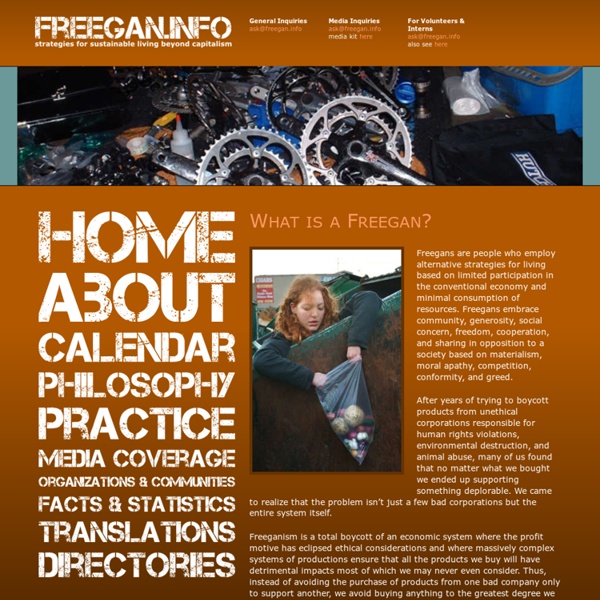11 Great Posters from When We Used to Care About Wasting Food
Over at NRDC Switchboard, Dana Gunders writes Dear Government: Food Waste is a Matter of Urgency. Please Take It Seriously. It's an important post about a subject that is often ignored: that well over 40% of food in North America is wasted. Worldwide, almost a third of all food is lost to poor harvesting, lousy distribution, poor storage and ridiculous portion sizes. And it isn't just the food wasted; it's also the water, fertilizer and fuel.
Learn Skills, share tools, save money and make great new friends
Streetbank is very like Justfortheloveofit. It lets you share things and skills with your neighbours and join in with community discussions. If you'd like to move your Justfortheloveofit account over to Streetbank, just enter your email address below and we'll pull your details across.
Signe Chanel: A look inside the House of Chanel
This documentary is a little old, but Signe Chanel (House of Chanel) takes us into the world of Chanel Haute Couture. As viewers we see how a collection moves along from conception of ideas, the drawings and pattern making. Then there is the intricate garment creation and eventually the runway show (where Oprah has a small cameo). But what happens after a fashion show? Watch and see, there are some lucky (wealthy) ladies who can afford to purchase these one-of-a-kind, personally tailored garments. If you have fast internet and some time of your hands, it is worth seeing the whole documentary, the amount of work and talent that goes into creating a single garment is amazing.
- Living Bueno - How to Live Anywhere in the World for Free
Skeptical Face Travel for free? This dudes crazy right? Today is part two of what I am calling the "Knowledgeable Nomads" series, in which I will be teaching my readers how they can travel the world while ballooning their savings accounts rather than draining them dry.
David Graeber on MAUSS
Have you noticed how there aren't any new French intellectuals any more? There was a veritable flood in the late '70s and early '80s: Derrida, Foucault, Baudrillard, Kristeva, Lyotard, de Certeau ... but there has been almost no one since. Trendy academics and intellectual hipsters have been forced to endlessly recycle theories now 20 or 30 years old, or turn to countries like Italy or even Slovenia for dazzling meta-theory.
What’s wrong with our global food system? [infographic]
Around the world every night, one in seven people go to bed hungry – that's almost one billion people. People are hungry not because there isn't enough food produced but because our food system is broken. In fact, 80% of the world's hungry are directly involved in food production. We can address this hunger if we support small-scale food producers, tackle climate change, and reduce food waste. Check out our latest infographic, produced in partnership with GOOD to learn about some of the ways that the food system can be fixed to improve the quality of life for millions.
Conscious Capitalism
In the words of Darden school of management professor and Conscious Capitalism, Inc trustee Ed Freeman, “We need red blood cells to live (the same way a business needs profits to live), but the purpose of life is more than to make red blood cells (the same way the purpose of business is more than simply to generate profits).” While making money is essential for the vitality and sustainability of a business, it is not the only or even the most important reason a business exists. Conscious businesses focus on their purpose beyond profit.
Paula Scher
Paula Scher moved to New York City and took her first job as a layout artist for Random House's children's book division. CBS Records In 1972, she was hired by CBS Records to the advertising and promotions department. After two years, she left CBS Records to pursue a more creative endeavor at a competing label, Atlantic Records, where she became the art director, designing her first album covers. A year later Scher returned to CBS as an art director for the cover department.



